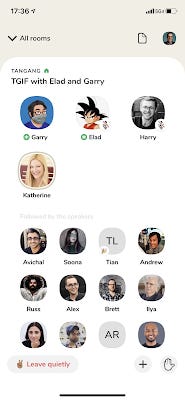Clubhouse: Most Interesting Consumer Startups of 2021 (Part 1)
This post is the first in a small series on the new wave of hyperinteresting consumer tech products that are most likely to have had society-level impact in 5 years. My first two posts are on Clubhouse and Substack [1]. Both are social network and media platforms of different types, and both have an opportunity to displace multiple existing services including Twitter. This post will cover why I think Clubhouse is the first new interesting social platform in a decade. The post on Substack focuses on the creation of journalist-entrepreneurs[2] and the transition of the media world (at least in part) back to subscriptions.
Clubhouse: the voice platform and social network
Clubhouse is the first new interesting social network in almost a decade. While TikTok has reached massive scale, it lacks the potential for societal transformation.
Clubhouse has interesting organic behavior emerging on it that suggests multiple paths forward. Whether it capitalizes on these or not comes down to vision and execution. Twitter missed capturing a lot of its organic behavior (for example small business CRM use cases, long form content, messaging via DMs etc.) so it is not a done deal for Clubhouse yet either. Execution & product vision matter to the eventual impact had.
Clubhouse uses may include:
Replacing talk (and other forms?) of radio. This is the dominant current use case. Between relationship talk-rooms to tech discussions, Clubhouse lets any group of users have participatory conversations on any topic. Many users seem to put Clubhouse on in the background as a form of low impact audio and chatter.
Podcasting & asynchronous audio. If you let participants opt-in to being recorded, and then allow for public posts, Clubhouse becomes a podcasting platform and network with its own distribution. This bridges live and asynchronous content and broadens the use case and impact of Clubhouse out of real time only content. This shift may be important creating an evergreen versus solely ephemeral content corpus.
Live shows. When I was working on mobile at Google in 2004, there were a lot of obvious mobile uses cases that would be replaced by apps - Whatsapp, Instagram and others were “expected” products. There were also a number of products I never would have a priori guessed like Uber (a stranger will show up in their car and pick you up). These products then seem obvious in hindsight. Live audio shows or broadcasts are one of these - for example, the Lion King musical was performed on Clubhouse recently. One could imagine DJ streams or other audio shared via Clubhouse as their userbase grows.
Panels, events, meetups, and meetings. A number of panels for the JP Morgan annual healthcare conference occurred on Clubhouse this year. While this may be a sign of COVID shelter in place, there is a big use case for virtual meetings without heavyweight video and desktops. Clubhouse may be the equivalent of audio subreddits - big rooms are performance art and small rooms with deep connections and content being produced.
Network extension and serendipity. Clubhouse creates voice-based serendipity in way Twitter created text-based new friendships and interactions. By joining a room where people you know (and do not know) are talking, you can talk to and get to know new people. If direct messaging is added, new unexpected connections can be formed.
Direct messaging. It will be interesting to see if Clubhouse adds a “DM” feature with either text (seems a no-brainer?) and/or audio (Seems less interesting? Next-gen voicemail? Does anyone use voicemail?) that will further strengthen weak social or interest-based ties. A lot of serendipity and friendships on Twitter emerged out of DMs and one could argue Twitter should have created a massive messaging app and network.
Group voice calls. Just as Twitter is used for public broadcast as well as smaller groups of teenagers, Clubhouse could become a replacement for group voice.
Long term: Twitter replacement? Clubhouse is one of two companies (alongside Substack) with a solid opportunity to displace Twitter. Clubhouse has:
An emerging social graph and interest graph that is the most Twitter-like of all the products I have seen in years.
Celebrity traction. Everyone from Perez Hilton to Oprah have participated in Clubhouse in one form or another. Right now most of the celebrities active on the platform are minor ones, but that could clearly morph.
A content unit Twitter can not compete with. If Clubhouse allows production of consistent audio clips, and commenting/interactions on those clips with texts and images it starts to create a scaffold on which to bootstrap a major part of Twitter activity. Especially given the emerging social & interest graph, and if DMs are added, Clubhouse has a shot at building a Twitter competitor over time.
Clubhouse is less than a year old (although both founders have been thinking about social for a decade) so it is still early days. However the company is off to an exciting start. My hope is 5 years from now we look back to see a company that has transformed major uses cases for society.

Thanks to Avichal Garg and Katherine Boyle for comments on this post.
NOTES
[1] Of course there will be some other product in private alpha that in hindsight will be super important too. Only the future knows what it is.
[2] This is all my own speculation and has nothing to do with actual company roadmaps.
OTHER POSTS
Markets:
Startup life:
Raising Money


